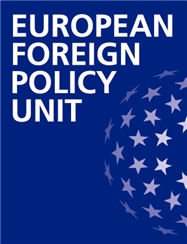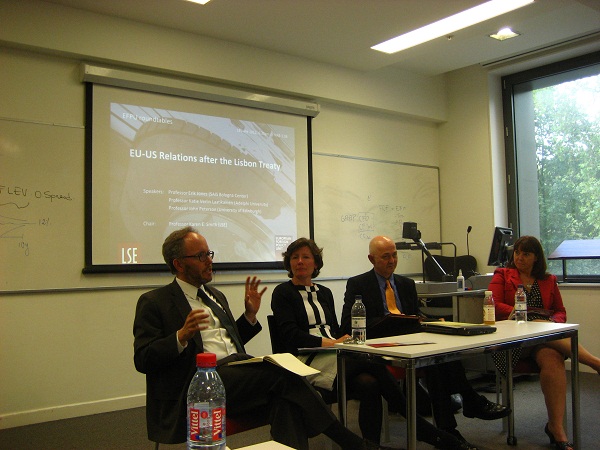 On 18 June 2012 the LSE’s European Foreign Policy Unit hosted the last of ten roundtables on ‘EU Foreign Policy after Lisbon’, entitled ‘EU-US Relations’. The panellists were Professor Erik Jones (SAIS Bologna Center), Professor Katie Laatikainen (Adelphi University), and Professor John Peterson (University of Edinburgh). The event was moderated by Professor Karen E. Smith of the LSE.
On 18 June 2012 the LSE’s European Foreign Policy Unit hosted the last of ten roundtables on ‘EU Foreign Policy after Lisbon’, entitled ‘EU-US Relations’. The panellists were Professor Erik Jones (SAIS Bologna Center), Professor Katie Laatikainen (Adelphi University), and Professor John Peterson (University of Edinburgh). The event was moderated by Professor Karen E. Smith of the LSE.
The transatlantic relationship remains one of the most durable partnerships of international relations. On a foundation of shared values and overlapping interests, the US and Europe have shaped today’s global order. As developing countries become more powerful international players – especially the BRICs – the US and Europe need to reconsider their historical relationship with regard to what it means for global order and their respective positions within it. However, there have also been considerable frictions and divisions, such as over trade agreements and state subsidies, the Kyoto protocol, the International Criminal Court, the Iraq war, or the handling of the fallout from the financial crisis, to name but a few. Both the US and Europe stress the inescapability of their bond in order for them to maintain their predominant position on the international scene. So how does the US perceive the EU? Is the EU viewed as a coherent and effective foreign policy actor by the US, or does Kissinger’s (unconfirmed) quip about that lacking phone number still hold true? Is the relationship portrayed in a cooperative and mutually beneficial fashion, or is the tone growing increasingly disenchanted and adversarial? And what are the prospects for the transatlantic relationship in an emerging multipolar order?

The most profound change in transatlantic relations rests in the fact that Europe has lost much of its strategic relevance for the US. The gradual global shift of power towards Asia (see the blog entry on The View from Asia) precipitated the US’ recent strategic pivot towards the Pacific. A minor yet not negligible factor in this regard is the changing ethnic composition of the US, meaning less European and more Asian and Hispanic. Further, European integration has lost much of its post-war pacifistic validation. John Peterson notes that while Obama is overall supportive of European integration, this is true for purely pragmatic reasons. A stable Europe is essential for America to be able to reorient its attention towards Asia, and a strong Europe as the primary international partner is crucial for tackling many of the US’ foreign policy challenges.
What does not play in the EU’s favour is that it often faces a worrying lack of understanding of its institutions and processes on the other side of the pond, even among senior officials. And the headlines that come out of Brussels these days are hardly welcomed in Washington. The EU’s failure to effectively deal with its debt crisis is seen as choking the global recovery, as well as threatening Obama’s re-election. The increasing polarisation of US politics has led to a considerable amount of Europe-bashing by both presidential candidates and is likely to further increase as the contest for the White House intensifies. The EU’s recent Lisbon treaty changes are also met with scepticism. Instead of asserting the EU with more coherence on the international stage, the picture is one of paralysis. High Representative Ashton seems to be struggling with her new assignment, European Council President Van Rompuy is engrossed in resolving the Euro-crisis, and the newly established European External Action Service has been mired in vicious turf wars. Consequently, Katie Laatikainen’s overall assessment of the treaty is it representing a step back for multilateralism globally.
This being said, there remains a strong conviction – at least within the present US administration – that cooperation with the EU is and will remain essential to US foreign policy. The underlying idea is that the US cannot achieve all its objectives on its own, nor should it have to. In line with this, Obama coined a new notion of American leadership that is aimed at creating the conditions that enable other actors to assume responsibility for global affairs – ‘leading from behind’ – as exemplified by the international intervention in Libya where the US was happy to let Britain and France lead the charge (note that the EU itself proved decisively unable to put a crisis management operation into the field – see also the blog entry on the Common Security and Defence Policy). As pointed out by Erik Jones, even though European efforts to resolve the Euro-crisis attract much criticism, the Obama administration conducted a major pivot to embrace the EU as its most important global partner. What this also means, however, is that Obama has clearly staked a lot on transatlantic cooperation, because if Europe does not come through and deliver (such as providing security in its neighbourhood, and resolving its debt crisis), many US foreign policy objectives will be difficult to achieve. Whether the EU is willing and able to shoulder this burden remains to be seen.
Moritz Reinsch
PhD candidate, European Institute, LSE


